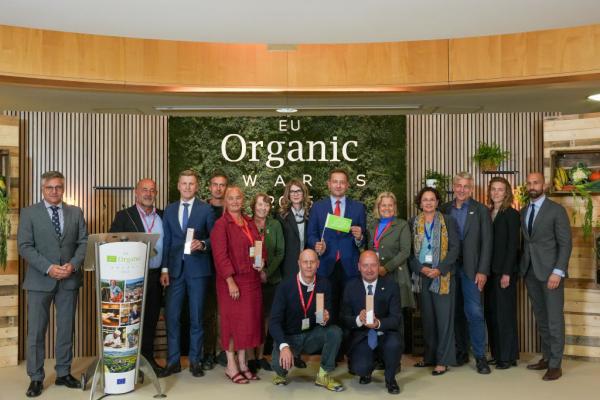Categories and awards
The EU organic awards comprise 7 awards across 6 different categories. They acknowledge different actors along the organic value chain that have developed an excellent, innovative, sustainable, and inspiring project producing real added value for organic production and consumption.
The inaugural EU organic awards took place in 2022. Be inspired by previous winners.
Ms Albina Yasinskaya, Rozino organic farm, Rozino, Plovdiv region, Bulgaria
At Rozino Organic Farm, Albina leads Bulgaria’s first environment social governance certified farm with a fully closed production cycle. Producing organic dairy, meat, and ice cream, the farm follows permaculture and zero-waste principles while boosting local employment and education. As a national trendsetter, Albina shows how transparent, sustainable farming can be adapted and applied successfully worldwide.
Mr Lieven Devreese, Het Polderveld, Knokke-Heist, Flanders, Belgium
Lieven runs Het Polderveld, a community-supported organic farm near the Belgian Dutch border. Supplying food to families and even a hospital, this farm shows how agriculture can nourish both people and communities. With fair wages, mental health initiatives, and direct links to consumers, Het Polderveld proves that farming is about relationships between soil, farmers and society.
Võru County, Estonia
Located in southeastern Estonia, Võru County is building a sustainable organic food supply chain. By 2024, they successfully integrated at least 20% organic food in all schools and kindergartens, and every educational institution now proudly displays an eco-label. The Võru County Organic Agreement boosts local economies, supports rural entrepreneurship, creates new jobs, and raises awareness about healthy, organic diets.
Valpaços, Alto Tâmega, Vila Real, Portugal
Valpaços is a rural municipality in northern Portugal with more than 14 500 inhabitants. It is a national leader in organic farming and integrated sustainability, with 516 certified organic producers, the highest number in Portugal. Education on sustainability, environmental measures, and innovation are at the forefront, supported by political leadership, inter-institutional cooperation, and inclusive strategies. Valpaços’ organic treasures include award-winning PDO and PGI products like wine, olive oil, almonds, chestnuts, and honey.
Joseph Brotmanufaktur GmbH, Burgschleinitz, Lower Austria, Austria
Based in Lower Austria, Joseph Brot is the world’s largest artisan bakery, processing all its organic flour entirely by hand. Through partnerships with 24 smallholder farms, they cultivate 14 rare grain varieties while preserving biodiversity and regional ecosystems. The business has a 100% craftsmanship principle which means 100% commitment to sustainability. With a team of 84, more than half of them women, Joseph Brot champions craftsmanship, fair supply chains, and original grain culture in every loaf.
Radis&Bona eG, Regensburg, Bavaria, Germany
This cooperative farm shop in Regensburg makes local organic products accessible to everyone. Offering a full range of fruit, vegetables, fresh and canned goods from within an 80 km radius, Radis&Bona brings together local farmers and consumers under one roof. Suppliers help set prices and can become cooperative members themselves. Powered by green energy and packaged without waste, it’s a blueprint for fair, transparent, and hyper-local food systems.
Category 6: Best organic restaurant/food service
The objective of this award is to reward an SM restaurant/food service restaurant (standalone or part of a hotel) and/or food service (caterer or canteen) proposing organic certified references in their menu. This award is organised by the European Economic and Social Committee.
Peskesi restaurant, Heraklion, Crete, Greece
In Heraklion, Peskesi brings Crete’s culinary heritage back to life. From its own regenerative farm to the restaurant’s biodynamic menu, the restaurant embraces the philosophy of "Farm to Table" and "Table to Farm", with 98% of its inputs involving local partnerships. They also organise educational events and conform to fair trade practices. The whole enterprise is a shining example of how food can nourish both people and a community.
Applications for the 2025 edition closed on 27 April 2025 23:59:59 CEST. These awards are non-financial and were handed over on 23 September 2025, which is EU Organic Day.
Applications
Reasons to apply
Do you want to contribute to the greater public awareness of organic production in the EU? Do you want to contribute to the greater affordability and/or accessibility of organic products in the EU? Have you developed and implemented, or are you still implementing, an excellent, innovative, sustainable, and replicable project for this purpose? Would you like to increase public awareness of the project?
If the answer to any of the above questions is 'yes', you should consider entering for the next edition of the EU organic awards. If you win, you will receive a non-financial recognition award and greater public visibility for your project. So, whether you are:
- an organic farmer
- a city or region serving organic meals to patients or pupils or otherwise promoting organic production
- a business in the organic food chain with a unique approach
- you should think about entering the EU organic awards.
Application process
Applicants for the 2025 EU organic awards were asked to:
- read the different sections of this website, in particular the eligibility criteria and the selection criteria;
- choose the award category they wished to enter;
- apply online from 11 February until 27 April 2025 23:59:59 CEST;
- provide answers to closed guiding questions (some relating to the four principles of organic and the sustainability pillars), to help the jury to obtain more information about the applicants.
Any actor or institution along the organic value chain with a noteworthy project contributing to the greater affordability and/or accessibility of organic products in the EU can apply. Project promoters must be established or residents in the EU. Applications must be submitted in one of the official EU languages and the projects EU based.
Applications for the EU Organic Awards had to meet the following eligibility criteria:
a) The starting point to apply for one of the awards is the EU organic awards webpage, which linked to the online application forms for each of the awards during the required period. Applications had to be submitted by 27 April 2025, 23:59:59 CEST at the latest.
Only complete applications (all sections filled in) submitted via the online platform by the deadline were considered once the application period closed.
b) Applications had to be in one of the official EU languages.
c) Applicants were required to be legal or natural persons established or resident in one of the 27 Member States of the EU.
d) The project submitted had to be EU based and refer clearly to one of the 6 award categories/7 awards. The same project could not be submitted for several award categories/awards. Each applicant could only apply for one single award. The maximum number of applications per award was one.
e) The winners of the previous editions cannot re-apply for the 2025 edition. The non-winning finalists of the previous editions could re-apply for the 2025 edition.
f) The project was required to either have been fully implemented already or be in a sufficiently mature state so as to enable the jury to assess it (i.e. physical implementation should be advanced enough to demonstrate the achievement of the objectives).
g) Specific eligibility criteria for each award category:
- Best organic farmer (female) and Best organic farmer (male): Certified accordingly to the Regulation (EU) 2018/848 of 30 May 2018 on organic production and labelling of organic products and repealing Council Regulation (EC) No 834/2007;
- Best organic region/bio-district: A ‘bio-district’ was defined as a geographical area where farmers, the public, tourist operators, associations and public authorities enter into an agreement for the sustainable management of local resources, based on organic principles and practices. Organic region had no specific eligibility criteria;
- Best organic city: No specific eligibility criteria; in case the city operates one or more organic farms or stores, proof of their organic certification had to be provided. This proof had to be a valid certificate at the moment of submission;
- Best organic food processing SME: Enterprise certified according to Regulation (EU) 2018/848, and having 100% organic production and complying with the SME definition (an enterprise that employs fewer than 250 persons and has an annual turnover not exceeding EUR 50 million, and /or an annual balance sheet total not exceeding EUR 43 million). Cooperatives were understood as enterprises. Processing was understood as defined by Regulation (EU) No 852/2004;
- Best organic food retailers: Enterprise certified according to Regulation (EU) 2018/848 and having 100% organic certified references on sale (excluding non-food products or food products for which there was no organic availability) and complying with the SME definition (an enterprise that employs fewer than 250 persons and has an annual turnover not exceeding EUR 50 million, and/or an annual balance sheet total not exceeding EUR 43 million). Cooperatives were be understood as enterprises;
- Best organic restaurant/food service: Enterprise having 100% organic certified references in their menu, where possible and complying with the SME definition (an enterprise that employs fewer than 250 persons and has an annual turnover not exceeding EUR 50 million, and/or an annual balance sheet total not exceeding EUR 43 million). Cooperatives were understood as enterprises.
All eligible applications were assessed by the EU Organic Awards jury against the following horizontal award criteria:
- Excellence: The awardee was required to have developed an excellent initiative producing real added value for organic production. This meant good results and impact of the project in relation to its initial objectives. Projects needed to demonstrate their impact on the area and territory concerned and show their results against the initially set targets and objectives.
- Innovative character of the project in the selected award category: Projects could not be "business as usual", but had to demonstrate new approaches, new organisational methods, or the development of new (or significantly) improved results for organics. The criteria for measuring the innovative character for each category were described in more detail in the dedicated section of the category.
- Sustainability pillars (environmental, social and economic) of the project: Projects needed to demonstrate their sustainability and their future as a self-standing initiative or project detailing how their project meets each pillar of sustainability in 3 different sub-sections.
- Transferability and possibility to replicate the project elsewhere in the EU: The project needed to demonstrate that it represented good practice in a wider (EU) context and that it inspires or could inspire other places. The project also needed to show good ways of communicating its goals and results.
- Young farmer (category 1): in order to give more visibility to young farmers, in case of equivalent points in the final scoring, preference was given to farmers who are maximum 40 years old.
The applicants were be asked guiding questions, developed in relation to the four principles of organic agriculture and the sustainability pillars, as well as a project summary. These questions helped the applicants to better structure their answers and the jury to obtain more data about the applicants.
Timeline
- 11 February 2025
Launch of the application period for the awards
- 27 April 2025
Deadline for the submission of applications: 27 April 2025, 23:59:59 CEST.
- June 2025
Awards evaluation decision
- 23 September 2025
Awards ceremony
Be inspired by the winners
Meet the winners of the 2025 edition. Watch the full recording of the fourth EU organic awards ceremony that took place in Brussels
This event involved representatives of the European Commission, the European Parliament, the Council of the European Union, the European Economic and Social Committee, the Committee of the Regions, COPA-COGECA and IFOAM Organics Europe to discuss the future of the organic sector in Europe.

- News article
This year’s EU Organic Awards winners is a list of innovative, sustainable projects across Europe’s organic value chain. Their work proves how organic farming can add value, create rural jobs, and build resilient food systems.
Best organic farmer (female)
Winner
- Ms Albina Yasinskaya, Rozino organic farm, Rozino, Plovdiv region, Bulgaria
Finalists
- Ms Sonia Meirhaeghe, SEP Terobio, Fauges, Aube, France
- Ms Kaisa Rautakannel, Kuorttisen Luomukanala (organic poultry farm), Lappeenranta, South Karelia, Finland
Best organic farmer (male)
Winner
- Mr Lieven Devreese, Het Polderved, Knokke-Heist, Flanders, Belgium
Finalists
- Mr József Büki, Velence-Bio Kft., Velence, Fejér county, Hungary
- Mr Stefan Romstorfer, Neuland.bio, Raggendorf, Lower Austria, Austria
Best organic region/bio-district
Winner
- Võru County, Estonia
Finalists
- Bamberger Land Eco model, Bamberg, Bavaria, Germany
- Region of Murcia, Spain
Best organic city
Winner
- Valpaços, Alto Tâmega, Vila Real, Portugal
Finalists
- Chaves, Alto Tâmega, Vila Real, Portugal
- Bio-Stadt Bonn, North Rhine-Westphalia, Germany
Best organic food processing SME
Winner
- Joseph Brotmanufaktur GmbH, Burgschleinitz, Lower Austria, Austria
Finalists
- Herta Bio Apicole SRL, Galeș, Sibiu, Transilvania, Romania
- Cantero de Letur, S.A, Albacete province, Castilla-La Mancha, Spain
Best organic food retailer
Winner
- Radis&Bona eG, Regensburg, Bavaria, Germany
Finalists
- Din drag de Bucovina Flying Market, Suceava county, Romania
- Kornblume Brinker GmbH, Lingen, Lower Saxony, Germany
Best organic restaurant/food service
Winner
- Peskesi restaurant, Heraklion, Crete, Greece
Finalists
- Biohotel St. Daniel, Štanjel, Primórska region, Slovenia
- Zotter Schokolade GmbH, Riegersburg, Styria, Austria
Best organic farmer (female)
Winner
- Reinhild Frech-Emmelmann, Reinsaat GmbH, St. Leonhard am Hornerwald, Lower Austria, Austria
Finalists
- Blagovesta Vasilieva, The wild farm (ДИВАТА ФЕРМА), Gorno Pole, Eastern Rhodopes, Bulgaria
- Caroline Devillers, Bel Go Bio, Hollogne-sur-Geer, province of Liège, Belgique
Best organic farmer (male)
Winner
- Benny Schöpf, Kartoffelkombinat, München, Bavaria, Germany
Finalists
- Gianpaolo Mancini, Il sentiero del Riccio, Sicignano degli Alburni, Salerno, Italy
- Tommi Hasu, LuomuMattinen, Oravala, Kouvola, Finland
Best organic region
Winner
- South Savo, Finland
Finalists
- Comunidade Intermunicipal do Alto Tâmega e Barroso, Chaves, Portugal
- Comunidad autónoma de Castilla - La Mancha, Spain
Best organic city
Winner
- BioStadt Bremen, Germany
Finalists
- Cascais, Lisbon district, Portugal
- Las Rozas, Community of Madrid, Spain
Best organic “bio-district”
Winner
- Sörmland Bio-district, Sörmland, Sweden
Finalists
- Distretto del Cibo Monregalese – Cebano, Cuneo, Piedmont, Italia
- Bioregião de S. Pedro do Sul, Viseu district, Beira alta, Portugal
Best organic food processing SME (Small and Medium Enterprises)
Winner
- Gino Girolomoni Cooperativa Agricola, Isola del Piano, Montebello, Marche, Italy
Finalists
- Biologon GmbH, Hochfilzen, Tyrol, Austria
- Organic veggie food GmbH/SOTO organic specialities, Bad Endorf, Bavaria, Germany
Best organic food retailer
Winner
- SAiFRESC, Catarroja, Valencian Community, Spain
Finalists
- BIOGAST GmbH, Zwettl, Lower Austria, Austria
- Coolanowle Organic Meats, Ballickmoyler, County Laois, Ireland
Best organic restaurant/food service
Winner
- Kalf & Hansen, Stockholm, Sweden
Finalists
- B2 Bio pur GmbH, Binsdorf, Baden-Württemberg, Germany
- Biohotel St. Daniel, Štanjel, Primórska region, Slovenia
Best organic farmer (female)
Winner
- Clara Benito Pacheco (Entrelobas) - Serrada de la Fuente, Spain
Finalists
- Małgorzata Pucer (Pasiekapucer) - Barciany, Poland
- Céline Clenet (La Casseline) - Cassel, France
Best organic farmer (male)
Winner
- Thomas Moschos (Moschos Farm) – Kastoria, Greece
Finalists
- Roberto Giadone (Natura Iblea) - Ispica, Sicily, Italy
- Mikhaylo Haliv (Tomelloso) - Ciudad Real, Spain
Best organic region
Winner
- Burgenland, Austria
Finalists
- Dordogne, France
- Centre-Val de Loire, France
Best organic city
Winner
- Stadt Wien, Austria
Finalists
- BioStadt Bremen, Germany
- Hajdúnánás, Hungary
Best organic “bio-district”
Winner
- Idanha-a-Nova, Beira Baixa, Portugal
Finalists
- Bio Região de S. Pedro do Sul, Viseu district, Portugal
- Biodistretto della Via Amerina e delle Forre, Civita Castellana, Italy
Best organic food processing SME
Winner
- The Merry Mill - Vicarstown, County Laois, Ireland
Finalists
- Fürstenhof GmbH - Finkenthal, Germany
- Ekološka kmetija Kukenberger – Trebnje, Slovenia
Best organic food retailer
Winner
- Gut Wulksfelde– Tangstedt, Hamburg, Germany
Finalists
- Valle y Vega Cooperativa Agroecológica de Granada - Churriana de la Vega, Andalucia, Spain
- NaturaSì Conegliano – Conegliano, Veneto, Italy
Best organic restaurant/food service
Winner
- Luftburg - Kolariks Freizeitbetriebe GmbH - Vienna, Austria
Finalists
- Trnulja Country Estate - Ljubljana, Slovenia
- Biohotel St. Daniel - Štanjel, Slovenia
Best organic farmer (female)
Winner
- Nazaret Mateos Álvarez (Entresetas) – Paredes de Nava, Palencia, Spain
Finalists
- Katharina Lichtmannsperger (VLG Obervetterbachgut) – Thalgau, Salzburg, Austria
- Sara Vezza (Azienda Agricola Sara Vezza) – Localitá Castelletto, Monforte d’Alba, Piemonte,Italy
Best organic farmer (male)
Winner
- David Pejić (Zrno eko imanje) – Dubrava, Zagreb County, Croatia
Finalists
- Gianpaolo Mancini (Il Sentiero del Riccio) – Sicignano degli Alburni, Salerno, Campania, Italy
- TomKass (Kass-Haff S.àrl) – Rollingen, Luxembourg
Best organic region
Winner
- Occitanie, France
Finalists
- Centre-Val de Loire, France
- Comunitat Valenciana, Spain
Best organic city
Winner
- Gemeinde Seeham am Obertrumer See, Salzburg, Austria
Finalists
- Municipality of Troyan, Bulgaria
- Stadt Wien, Austria
Best organic bio-district
Winner
- Associazione Bio-Distretto Cilento – Campania, Italy
Finalists
- Association Biovallée – Eurre, France
- Centro Municipal Cultura e Desenvolvimento de Ihanha-a-Nova – Centro region, Portugal
Best organic SME
Winner
- Goodvenience.bio GmbH – Magdala, Thuringia, Germany
Finalists
- Gino Girolomoni Cooperativa Agricola – Isola del Piano, Pesaro and Urbino province, Italy
- Labonca Biohof GmbH – Burgau, Styria, Austria
Best organic retailer
Winner
- La ferme à l’arbre de Liège – Lantin, Liège, Belgium
Finalists
- Ecoveritas SA – Barcelona, Spain
- Bio MERCATO, seiVital GmbH – Kempten, Bavaria, Germany
Best organic restaurant
Winner
- Lilla Bjers HB – Visby, Gotland Island, Sweden
Finalists
- Trattino – Lyon, France
- Restaurant Luftburg (Kolariks Freizeitbetriebe GesmbH) - Kolarik im Prater – Wien, Austria


EU Organic Awards 2025Commissioner for Agriculture and Food Christophe Hansen opening the EU Organic Awards 2025 

EU Organic Awards 2025 – Best organic farmer (female) – Ms Albina Yasinskaya, Rozino organic farm, Rozino, Plovdiv region, BulgariaMr J. Plagge (President of IFOAM Organics Europe), Ms A. Yasinskaya (Rozino organic farm) and Commissioner C. Hansen 

EU Organic Awards 2025 – Best organic farmer (male) – Mr Lieven Devreese, Het Polderved, Knokke-Heist, Flanders, BelgiumCommissioner C. Hansen, Mr L. Devreese (Het Polderved) 

Best Organic Region/Bio-district – Võru County, EstoniaMs K. Bille (European Committee of the Regions), Mr T. Toots (Board Member of the Development Centre of Võru County) and Commissioner C. Hansen 

Best Organic City – Valpaços, Alto Tâmega, Vila Real, PortugalMs K. Bille (European Committee of the Regions), Mr J. Mata Pires (Município de Valpaços) and Commissioner C. Hansen 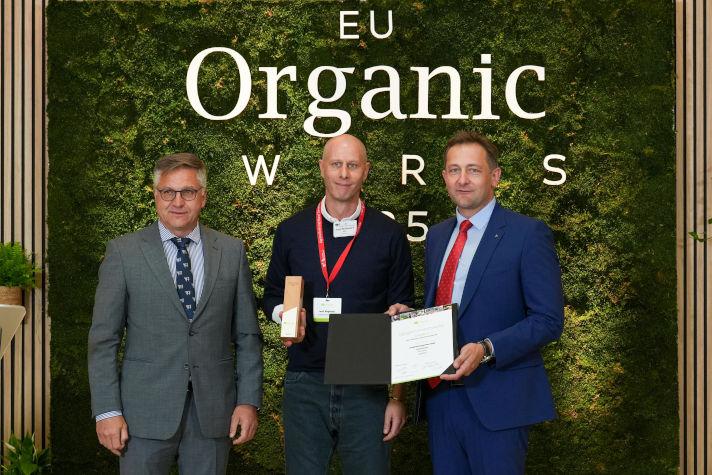
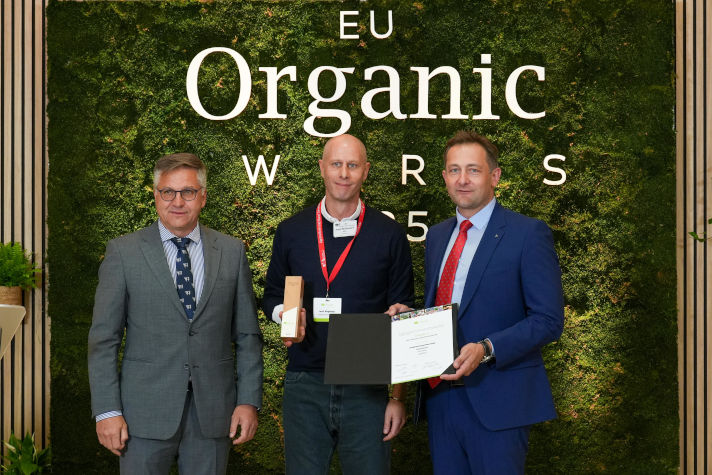
Best Organic Food Processing SME – Joseph Brotmanufaktur GmbH, Burgschleinitz, Lower Austria, AustriaMr S. Tchoukanov (European Economic and Social Committee), Mr J. Weghaupt (Joseph Brotmanufaktur GmbH) and Commissioner C. Hansen 

EU Organic Awards 2025Commissioner Christophe Hansen and the moderator 

Best Organic Food Retailer – Radis&Bona eG, Regensburg, Bavaria, GermanyMr S. Tchoukanov (European Economic and Social Committee), Ms J. Hock-Klemm (Radis&Bona eG) and Commissioner C. Hansen 
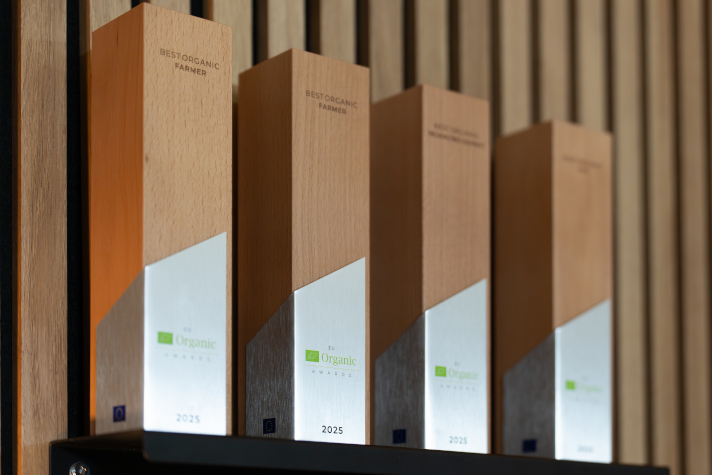
EU Organic Awards 2025EU Organic Awards 2025 

Best Organic Restaurant/Food Service – Peskesi restaurant, Heraklion, Crete, GreeceMr S. Tchoukanov (European Economic and Social Committee), Mrs M. Michalitsi and Mr P. Magganas (Peskesi restaurant) and Commissioner C. Hansen 

EU Organic Awards 2025Side event 

EU Organic Awards 2025Commissioner for Agriculture and Food Christophe Hansen opening the EU Organic Awards ceremony 

EU Organic Awards 2025Panel discussion with Elisabeth Werner, Director-General, Directorate-General for Agriculture and Rural Development, European Commission 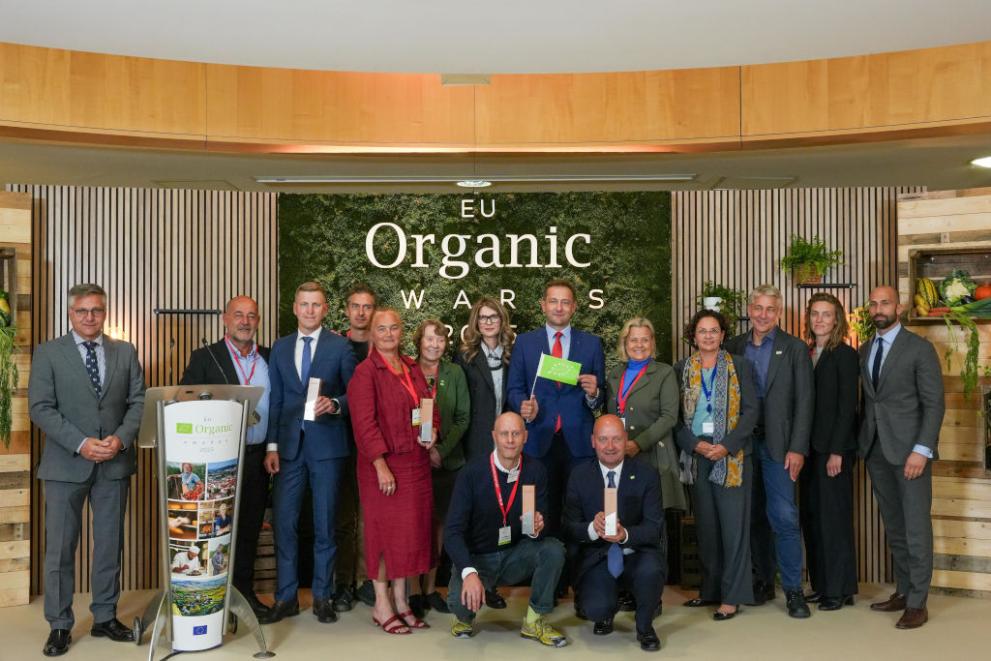

EU Organic Awards 2025The 2025 winners and representatives of the European Commission, the European Parliament, the Council of the European Union, the European Economic and Social Committee, the Committee of the Regions, COPA-COGECA and IFOAM Organics Europe. 

EU Organic Awards 2025EU Organic Awards 2025Mr S Tchoukanov, European Economic and Social Committee and Ms C Solstad, Council President 

EU Organic Awards 2025Side event
About the EU organic awards
Increases in organic production contribute significantly to reducing the use of chemical fertilisers, pesticides and antimicrobials and have positive effects on our climate, the environment, biodiversity and animal welfare.
The Commission has adopted the Action Plan for the Development of Organic Production in March 2021, including the launch of annual awards. They aim to reward the best and most innovative organic actors, contributing to the reduction of agriculture’s impact on the environment and climate.
Organisers
The EU organic awards are jointly organised by the European Commission, the European Economic and Social Committee, the European Committee of the Region, COPA-COGECA and IFOAM Organics Europe.
The jury deciding on the final winners comprised representatives of:
- The European Commission,
- The European Economic and Social Committee,
- The European Committee of the Regions,
- COPA-COGECA,
- IFOAM Organics Europe,
- The European Parliament and
- The Council of the European Union.
Organic farming, aquaculture and food in the EU
Regulation (EU) 2018/848 states in recital 1 that “Organic production is an overall system of farm management and food production that combines best environmental and climate action practices, a high level of biodiversity, the preservation of natural resources and the application of high animal welfare standards and high production standards in line with the demand of a growing number of consumers for products produced using natural substances and processes”.
Organic production is increasing in the EU. In 2019, 8.5% of EU agricultural land was under organic farming. This equalled 13.8 million hectares, up from 9.5 million hectares in 2012, a 45.8% increase. The countries accounting for most of the EU agricultural land under organic farming were Spain (2.4 billion hectares, 17.4% of the EU total), France (2.2 billion hectares, 16.2% of the EU total), Italy (2.0 billion hectares, 14.5% of the total) and Germany (1.3 billion hectares, 9.4% of the EU total) as per Eurostat organic farming statistics.
Across the entire value chain, almost 344,000 organic producers and over 78,000 organic processors were active in the EU. Organic farmers benefit from the price premiums that organic products fetch on the market and the rapidly growing final consumer demand for organic products. In 2019, the EU market accounted for 38.8 billion euro in a global market of 106.4 billion euro, second after the US market accounting for 48.2 billion. Large markets in the EU are Germany (12.0 billion) euro and France (11.3 billion euro), as per FIBL statistics.
Per capita consumer expenditure on organic products is highest in Denmark (344 euro, equivalent to 12% of grocery shopping) and Luxembourg (264 euro, equivalent to 8% of grocery shopping), as per FIBL statistics.
Consumer awareness of the EU organic logo is increasing. In 2020, 56% of Eurobarometer survey respondents recognised the logo, compared to 27% in 2017. 80% of survey respondents believe that organic products are more environmentally friendly and respect higher animal welfare standards.
Food for Europe podcast episodes
A selection of the Food for Europe podcast episodes are dedicated to organic farming in the EU, as well as the launch of the EU organic awards in 2022 and the 2023 awards ceremony. All the episodes of the "Food for Europe" podcast are released in English, French and German.
 Celebrating the best of organic farming and food
Celebrating the best of organic farming and food29 September 2023
 EU Organic Awards
EU Organic Awards24 March 2022
 EU organic action plan – what's on the plate?
EU organic action plan – what's on the plate?1 April 2021
 Strengthening the EU organic label
Strengthening the EU organic label18 March 2021
 Building trust in organic farming in Europe
Building trust in organic farming in Europe11 March 2021
 Introducing organics
Introducing organics4 March 2021
Documents
- 20 JANUARY 2025
- 14 JANUARY 2025
- български(248.7 KB - PDF)
- español(203.56 KB - PDF)
- čeština(265.33 KB - PDF)
- dansk(201.73 KB - PDF)
- Deutsch(206.06 KB - PDF)
- eesti(253.42 KB - PDF)
- ελληνικά(269.75 KB - PDF)
- français(196.91 KB - PDF)
- Gaeilge(201.48 KB - PDF)
- hrvatski(267.87 KB - PDF)
- italiano(199.87 KB - PDF)
- latviešu(246.07 KB - PDF)
- lietuvių(266.76 KB - PDF)
- magyar(255.27 KB - PDF)
- Malti(280.31 KB - PDF)
- Nederlands(201.13 KB - PDF)
- polski(258.17 KB - PDF)
- português(205.87 KB - PDF)
- română(246.59 KB - PDF)
- slovenčina(276.43 KB - PDF)
- slovenščina(262.41 KB - PDF)
- suomi(197.16 KB - PDF)
- svenska(198.99 KB - PDF)
- 10 FEBRUARY 2025
Related links
At a glance information on EU organic policy, the organic logo and legislation relating to the organic sector, as well as frequently asked questions.
This plan aims to drive investment and innovation in organic farming and boost demand for organic food. Check out what has been achieved so far.
Information on the new organic legislation in force since January 2022, the consultation that was held about the new law and the action plan for organics.
Policy, rules, organic certifications, support and criteria for organic farming.


